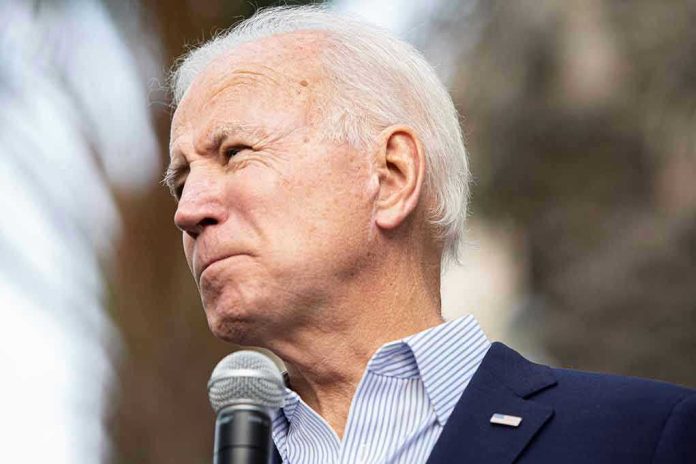
When a sitting president accuses his predecessor of choosing Silicon Valley billionaires over the American people, the fight isn’t just about politics—it’s about which vision of America will survive the next storm of inequality and influence.
Story Snapshot
- Biden claims Trump’s policies favor tech billionaires like Bezos, Musk, and Zuckerberg over working Americans.
- Trump’s administration, newly reinstalled in 2025, faces criticism for deepening economic inequality amid government shutdowns.
- Tech leaders’ influence in Washington surges as their fortunes and companies become political footballs.
- The debate over the social contract and billionaire power rages at the highest levels of government.
Biden Confronts Trump: Billionaires or the People?
Joe Biden’s rebuke of Donald Trump rippled through American politics like a thunderclap at a Fourth of July picnic. Standing at a podium, voice steely, he accused Trump of “putting the fortunes of Bezos, Musk, and Zuckerberg over the needs of everyday Americans.” The charge wasn’t abstract. It came as food benefits were threatened by a government shutdown, while the richest men in tech sat as honored guests at Trump’s second inauguration. What once would have felt like campaign bluster now played out as a real-time clash of priorities, with the White House as battleground and the American middle class as collateral.
Trump, by contrast, relished his role as kingmaker of innovation, parading the tech elite as symbols of “American greatness.” His administration’s new tariffs sent tech stocks tumbling, slashing billions from the net worth of the very moguls he celebrated. Yet the pain for the titans of industry was fleeting compared to the uncertainty faced by families relying on social safety nets. Biden seized on this contrast, painting Trump’s economic policies as a deliberate choice to shelter the ultra-wealthy while everyday Americans shouldered the fallout.
Silicon Valley’s Washington Ascendancy
Tech’s top brass didn’t just attend the inauguration—they became fixtures in the new administration’s orbit. Elon Musk, Jeff Bezos, and Mark Zuckerberg all navigated their own shifting alliances with Trump, each seeking policy favor and regulatory shelter. Mark Zuckerberg, once a vocal critic, pivoted, ending Meta’s third-party fact-checking in line with Trump’s free speech crusade. Musk celebrated the administration’s promise of a lighter regulatory touch, while Bezos sought market stability amid tariff turbulence. These relationships weren’t just transactional; they signaled a new era where tech’s influence on public policy would be more overt—and more controversial—than ever before.
While Trump’s team claimed their embrace of Silicon Valley was about securing America’s technological edge, Biden countered that it came at the expense of fairness and opportunity. The message was echoed across media outlets and advocacy groups, who warned that the concentration of wealth and power in a handful of tech oligarchs was warping the very fabric of democracy. The public was left to wonder: were these alliances the price of progress, or a threat to the American promise?
The Human Cost of Economic Realignment
As tariffs shook the stock market and billionaires’ fortunes fluctuated, the real impact was felt far from Wall Street. Social safety net programs, including food assistance, faced cuts and delays as the government shutdown dragged on. Biden’s criticism zeroed in on this pain, arguing that Trump’s priorities left the vulnerable to fend for themselves while protecting the privileged. Oxfam and other advocacy groups decried the widening gulf between America’s richest and its working poor, urging urgent policy intervention before inequality became irreversible.
Biden slams Trump for putting Bezos, Musk, Zuckerberg over Americans The USA 🇺🇸 has one Senate. Investigators of history see the government corruption. The FBI developed many videos on government corruption through the centuries. https://t.co/txQAVJABnX
— Lever (@Leverk1d) November 9, 2025
For American families living paycheck to paycheck, the drama in Washington was more than a spectacle—it was a struggle for security. As partisan rhetoric raged, the core question remained: whose interests should the government serve? The tech elite, flush with influence and resources, or the millions for whom a missed benefit payment could mean real hardship?
The Stakes: Democracy, Markets, and the Social Contract
Analysts and economists dissected the fallout with characteristic rigor. Some argued that Trump’s alignment with tech was pragmatic support for American innovation, necessary to compete in a global digital economy. Others warned that unchecked billionaire influence would erode democratic accountability and social cohesion. The impact on tech sector stability was immediate—market analysts charted steep dips and wild rebounds—but the longer-term effects on regulation and public trust loomed larger.
The deeper fight, many experts noted, was not just about tariffs or stock prices, but about the kind of country America wants to be. Will the government protect the vulnerable and restrain the powerful, or will it continue to concentrate wealth and influence in the hands of a few? As Biden and Trump traded blows, the nation was left staring into a future where the answers to those questions would shape not just the next four years, but the very soul of the republic.







